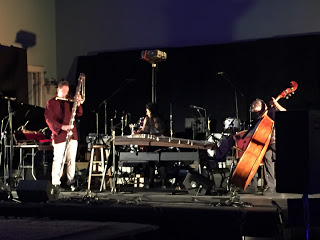 |
| Yoshiko Chuma’s School of Hard Knocks |
 |
| Three Stories: Robert Dick, Miya Masaoka, and Ken Filiano |
The Jazz & Poetry Choir Collective featured three poets plus a quartet of familiar musicians: Rosie Hertlein on violin, Christopher D Sullivan on bass, Warren Smith on vibes & Michael TA Thompson on percussion. Each poet and each musician read one poem. What made this work was that the music was often stripped down so that you could every word, the music was at times quiet, mysterious, thoughtful and solemn. Each poem was well selected and gave us much food for consideration. Although one of the poets chanted, “Jesus Loves Me”, I got the feeling that her or our prayers are not being answered by whomever we believe in. “Impeach Yourself” was another repeated refrain that made us smile. Often while one poet read, the other voices would answer with words to phrases underneath to enhance the themes. In dark times like now, when we have to deal with things like ‘alternative facts’ (or lies), it is time to ask “What is truth”? Much better than I would’ve imagined.
The debut of Tomas Fujiwara’s Double Trio was a much anticipated event. The personnel featured Mary Halvorson and Brandon Seabrook on guitars, Ralph Alessi and Taylor Ho Bynum on trumpet and cornet, and Gerald Cleaver and Tomas Fujiwara on drums. No bass used or needed here. Mr. Fujiwara did a great job of providing a series of smart, sly grooves so that double lines could interlock. While one guitar or trumpet would solo, the other could provide color or counterpoint. Mr. Ho Bynum took a number of explosive solos on cornet while Ralph Alessi (a generation older) took more strident, mature solos. At one point, Bynum kept switching mutes every few phrases, quite a restless explorer. Although Brandon Seabrook and Mary Halvorson are two of the most exciting and creative jazz/rock guitarists in the current Downtown Scene, they sound nothing alike. This sextet gave them an opportunity to play quick intricate lines while the other player soloed intensely on top. The double drummers were also well used and worked well together, splitting rhythmic chores just right. I was reminded at times of early days of double drummers like the Allman Brothers or the Grateful Dead.
Elders of the NYC Avant Jazz Scene, Trio 3 featured Oliver Lake on alto sax, Reggie Workman on double bass and Andrew Cyrille on drums and were last on the long bill. Instead of playing consistently free, the trio played mostly written material from across their 27 year carrier together. Each of the three members are integral to their focused, tight and sprawling sound/approach. Each got a chance to stretch, push some boundaries and take inspired solos. Mr. Lake’s bittersweet, Dolphy-esque playing really shined throughout. The trio was joined by Marc Cary on piano and Reggie Workman’s daughter on vocals to perform an old piece written by Reggie many years ago. The epic length work mentions famous battles and struggles our shared US history: “the Trail of Tears, Hiroshima, San Juan Hill, Bosnia…”. It was a long triumphant set which ended very late, way past midnight. What along, strong night, indeed! But many were tired and happy to wander out into the night.
- Day 1: Calling All Visions
- Day 2: The Resistance Begins
- Day 3: Pause and Reflection
- Day 4: Don’t Let Them Take Your Joy Away
- Day 5: Letting the Music Speak
- Day 6: Seeking Optimism

